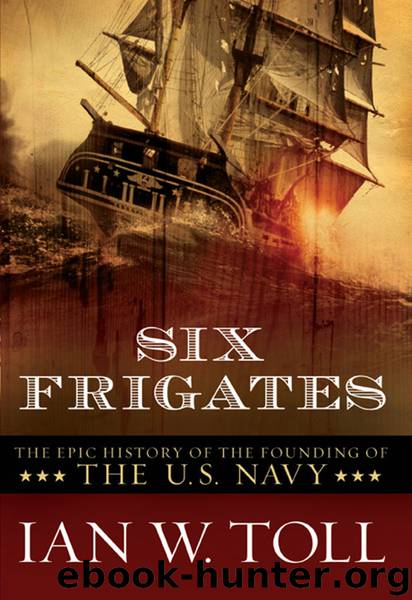Six Frigates by Ian W. Toll

Author:Ian W. Toll
Language: eng
Format: epub
Publisher: W. W. Norton & Company
Published: 2006-09-24T04:00:00+00:00
JEFFERSON AND MADISON WOULD HAVE LIKED to persuade England and the other warring powers of Europe to recognize an expansive version of American maritime rights, summed up in the slogan: “Free ships make free goods.” Jefferson chose a metaphor to justify the American position. In a civilized society, “the place occupied by an individual in a highway, a church, a theater, or other public assembly, cannot be intruded on, while its occupant holds it…. No nation ever pretended a right to govern by their laws the ship of another nation navigating the ocean. By what law then can it enter that ship while in peaceable and orderly use of the common element?”
The question of neutral maritime rights during wartime was hardly a new one. It was governed by an intricate set of historical and legal precedents. The navy of a belligerent power had the right to stop and search neutral merchant vessels, and to interdict shipments of “contraband”—arms, ammunition, and war materiel—to an enemy port. Belligerent powers, however, tended to favor a broader definition of contraband than neutrals were willing to concede. For example, Britain had provoked the indignation of several neutral maritime powers in 1778–83 by interdicting shipments of naval stores and timber from the Baltic seaports to France. The neutral powers had joined in an “Armed Neutrality,” and resolved to declare war on Britain if their rights were not respected. (The threat had influenced the British government’s decision to recognize American independence.) Jefferson and Madison did not dispute Britain’s right to stop American merchantmen and search them for contraband, nor its right to blockade an enemy port. But they insisted upon a narrow definition of contraband, and objected to “paper” blockades, which gave the Royal Navy a pretext to seize and condemn American vessels even when not laden with contraband.
With the return of the Pitt ministry to power in May 1804, the British government took a less fastidious view of neutral maritime rights. British naval power had virtually swept the French merchant marine from the sea, cutting the ties between France and its remaining overseas colonies. The English were determined not to allow the French economy to continue to prosper by shifting its traditional colonial mercantile trade into neutral ships. By a controversial doctrine known as the “Rule of 1756”—so called because it dated back to Seven Years’ War of 1756–63—England denied any nation the right to carry cargo on a route that would be denied to that nation’s vessels in a time of peace. For example, if France’s peacetime mercantile restrictions barred foreign ships from carrying goods between Guadaloupe and Le Havre (as they generally did), then England would not recognize a third nation’s right to trade on the same route during wartime (when the sea was no longer safe for French merchantmen). During the Napoleonic Wars, as in the earlier conflict, the rule had a very specific purpose: to sever all commercial tendons between France and the French West Indies.
American merchants circumvented the Rule of 1756
Download
This site does not store any files on its server. We only index and link to content provided by other sites. Please contact the content providers to delete copyright contents if any and email us, we'll remove relevant links or contents immediately.
| Africa | Americas |
| Arctic & Antarctica | Asia |
| Australia & Oceania | Europe |
| Middle East | Russia |
| United States | World |
| Ancient Civilizations | Military |
| Historical Study & Educational Resources |
The Radium Girls by Kate Moore(12026)
100 Deadly Skills by Clint Emerson(4924)
Rise and Kill First by Ronen Bergman(4785)
The Templars by Dan Jones(4689)
The Doomsday Machine by Daniel Ellsberg(4489)
The Rape of Nanking by Iris Chang(4211)
Killing England by Bill O'Reilly(4001)
Stalin by Stephen Kotkin(3965)
Hitler in Los Angeles by Steven J. Ross(3946)
12 Strong by Doug Stanton(3548)
Hitler's Monsters by Eric Kurlander(3341)
Blood and Sand by Alex Von Tunzelmann(3203)
The Code Book by Simon Singh(3189)
Darkest Hour by Anthony McCarten(3129)
The Art of War Visualized by Jessica Hagy(3007)
Hitler's Flying Saucers: A Guide to German Flying Discs of the Second World War by Stevens Henry(2754)
Babylon's Ark by Lawrence Anthony(2676)
The Second World Wars by Victor Davis Hanson(2524)
Tobruk by Peter Fitzsimons(2516)
